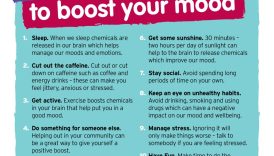Making Wellness a Priority: Tips for Simply Healthy Living

Understanding Wellness
Wellness is more than just the absence of illness; it encompasses a holistic approach that considers the physical, mental, and emotional aspects of life. It’s about thriving rather than merely surviving. When individuals prioritize wellness, they engage in activities that nurture their body, mind, and spirit, paving the way for a fulfilling existence. For example, think of wellness as a well-tended garden. Each aspect — the flowers (physical health), the trees (mental health), and the soil (emotional well-being) — must be nourished for the garden to bloom beautifully.
- Making Wellness a Priority: Tips for Simply Healthy Living
- Understanding Wellness
- Benefits of Healthy Living
- Setting Wellness Goals
- Identifying Personal Needs
- Establishing Realistic Targets
- Nutrition and Diet
- Importance of Balanced Diet
- Meal Planning Tips
- Exercise and Physical Activity
- Types of Workouts
- Incorporating Movement into Daily Routine
- Mental Health and Well-being
- Stress Management Techniques
- Self-care Practices
- Quality Sleep
- Importance of Sleep
- Tips for Better Sleep
- Hydration and Its Impact
- Benefits of Staying Hydrated
- Ways to Ensure Proper Hydration
- Social Connections
- Importance of Support Systems
- Building Meaningful Relationships
- Mindful Living
- Practicing Mindfulness
- Finding Balance in Life
- Holistic Approaches
- Integrating Mind, Body, and Spirit
- Exploring Alternative Therapies
Benefits of Healthy Living
Embracing a lifestyle centered on wellness yields numerous benefits, including:
- Improved Mood: Regular exercise and nutritious eating can greatly enhance mood and reduce feelings of anxiety.
- Better Physical Health: Reduced risk of chronic diseases like diabetes and heart disease.
- Increased Energy Levels: A balanced diet and regular exercise lead to higher energy to tackle daily tasks.
Adopting healthy living doesn’t have to be overwhelming; small, consistent changes can lead to significant improvements in quality of life.
Setting Wellness Goals
Identifying Personal Needs
Once the importance of wellness is understood, the next crucial step is identifying personal needs. This means reflecting on what areas of wellness require more attention in your life. Consider asking yourself:
- What aspects of my health feel out of balance?
- Am I often stressed or fatigued?
- Do I prioritize relationships and social connections?
For instance, someone might realize they neglect their mental health, prompting them to seek out mindfulness practices or therapy. By pinpointing these needs, a foundation is established for making informed wellness choices.
Establishing Realistic Targets
After identifying personal needs, the next step is establishing realistic targets. It’s important to set achievable goals that won’t lead to burnout or frustration. Here is how to approach this:
- SMART Goals: Ensure goals are Specific, Measurable, Achievable, Relevant, and Time-bound.
- Start Small: Instead of committing to an intensive workout plan, start by exercising for 15 minutes a day.
- Weekly Progress: Regularly review your progress and adjust as needed.
Setting practical goals fosters a sense of accomplishment and encourages sustainable lifestyle changes.
Nutrition and Diet
Importance of Balanced Diet
As one continues their journey towards wellness, the significance of a balanced diet cannot be understated. A well-rounded diet fuels the body, supports overall health, and enhances mental clarity. Consider this: when you eat a variety of foods, you provide your body with essential nutrients to function optimally. Some key benefits of a balanced diet include:
- Weight Management: Helps maintain a healthy weight, reducing the risk of obesity-related diseases.
- Increased Energy: A nutritious diet fuels energy levels throughout the day.
- Enhanced Mood: Nutrient-rich foods have been linked to better mental health outcomes.
Incorporating various food groups ensures your body receives the vitamins and minerals it needs to thrive.
Meal Planning Tips
Meal planning can seem overwhelming, but it is a powerful tool for achieving dietary goals. Here are some practical tips to make meal planning manageable:
- Plan Ahead: Dedicate a day each week to plan meals and snacks.
- Create a Shopping List: List ingredients based on your meal plan. This helps avoid impulse buys.
- Batch Cooking: Prepare meals in large quantities to save time during busy weekdays.
- Experiment with Recipes: Try new, healthy recipes to keep meals exciting.
With thoughtful meal planning, maintaining a balanced diet becomes a sustainable and enjoyable part of your wellness routine.
Exercise and Physical Activity
Types of Workouts
Building on the foundation of nutritious eating, integrating exercise into daily life is vital for maintaining wellness. Various types of workouts enhance different aspects of health, ensuring a well-rounded fitness routine. Consider these popular workout categories:
- Cardiovascular Exercises: Activities like running, cycling, and swimming boost heart health and improve endurance.
- Strength Training: Lifting weights or using resistance bands helps build muscle and supports metabolism.
- Flexibility Workouts: Yoga or stretching improves mobility and reduces the risk of injury.
- High-Intensity Interval Training (HIIT): Short bursts of intense activity followed by rest can be a highly efficient training method.
Engaging in a mix of these types can keep workouts interesting and comprehensive.
Incorporating Movement into Daily Routine
Beyond structured workouts, incorporating movement into everyday life is equally important. Here are some simple ways to stay active throughout the day:
- Take the Stairs: Opt for stairs instead of elevators whenever possible.
- Walk During Breaks: A quick walk during lunch breaks can lift mood and boost energy.
- Stretch at Your Desk: Perform small stretches or stand up periodically if you have a desk job.
- Active Hobbies: Choose physical hobbies like gardening or dancing that keep you moving while having fun.
By weaving movement into daily routines, individuals can enhance their physical health without feeling overwhelmed by the need for extensive exercise sessions.
Mental Health and Well-being
Stress Management Techniques
As physical activity enriches the body, nurturing mental health is equally critical to overall wellness. Managing stress effectively can greatly enhance one’s emotional well-being. There are numerous techniques to reduce stress and regain control over thoughts. Some helpful methods include:
- Deep Breathing Exercises: Take a moment to breathe deeply; it can calm the mind and reduce anxiety.
- Mindfulness Meditation: Practicing mindfulness helps increase self-awareness and keeps you grounded in the present.
- Physical Activity: Even a brief walk can significantly lower stress levels and release endorphins that elevate mood.
Harnessing these techniques can empower individuals to confront daily challenges with a clearer mind.
Self-care Practices
In addition to stress management, self-care practices play a vital role in mental health. Engaging in activities that promote relaxation and happiness can rejuvenate the spirit. Some self-care ideas include:
- Establishing Boundaries: Learn to say no to commitments that drain your energy.
- Creating a Relaxing Routine: Incorporate evenings of lounging with a good book or taking soothing baths.
- Connecting with Loved Ones: Spend time with friends or family to share experiences and foster support.
By implementing both stress management and self-care strategies, individuals can cultivate a healthier mental landscape, ultimately leading to enhanced well-being.
Quality Sleep
Importance of Sleep
Transitioning from mental well-being, it’s essential to recognize that quality sleep is foundational to overall health. Sleep is not a luxury; it is a necessity that profoundly impacts both physical and mental functioning. Adequate sleep:
- Enhances Cognitive Function: A well-rested mind leads to better decision-making and problem-solving skills.
- Supports Mood Regulation: Sleep deprivation can exacerbate feelings of stress and anxiety, while quality sleep helps stabilize emotions.
- Aids Physical Recovery: During sleep, the body repairs itself, making it crucial for recovery after workouts or illness.
One might wonder how a good night’s sleep can boost productivity and creativity—consider those moments when a fresh perspective arises in the morning!
Tips for Better Sleep
To cultivate quality sleep, introducing a few simple habits can make a world of difference. Here are some practical tips:
- Maintain a Consistent Schedule: Go to bed and wake up at the same time daily to regulate your body’s internal clock.
- Create a Restful Environment: Dimming the lights and eliminating noise can promote a calming atmosphere.
- Limit Screen Time: Reducing exposure to screens an hour before bed allows melatonin to build naturally.
- Practice Relaxation Techniques: Incorporating meditation or gentle stretching before bed can ease the mind and prepare the body for sleep.
By prioritizing quality sleep and adopting these tips, individuals pave the way for better health, improved mood, and increased productivity.
Hydration and Its Impact
Benefits of Staying Hydrated
Continuing from the importance of sleep, it’s essential to recognize that hydration plays a critical role in maintaining overall wellness. Water is not just a thirst quencher; it is vital for numerous bodily functions. The benefits of staying hydrated include:
- Improved Physical Performance: Proper hydration helps maintain endurance levels during workouts and daily activities.
- Enhanced Cognitive Function: Dehydration can impair concentration and cognitive abilities, making it difficult to focus.
- Optimal Digestion: Drinking enough water supports digestion and helps prevent constipation.
Consider how a simple glass of water after waking up can rejuvenate the senses and kickstart your day!
Ways to Ensure Proper Hydration
To make hydration a habitual part of your wellness journey, here are some effective strategies:
- Carry a Water Bottle: Having water readily available encourages consistent sipping throughout the day.
- Set Reminders: Use smartphone apps or alarms to remind you to drink water at regular intervals.
- Infuse with Flavor: If plain water feels dull, infuse it with fruits, herbs, or cucumber for a refreshing twist.
- Track Your Intake: Some people find it helpful to use a hydration tracker to ensure they meet their daily goals.
By recognizing the impact of hydration and implementing these tips, individuals can greatly enhance their health and vitality.
Social Connections
Importance of Support Systems
Building on the foundation of hydration, social connections are crucial for overall well-being. Human beings are inherently social creatures, and having a reliable support system can significantly impact mental health. The importance of support systems includes:
- Emotional Resilience: Friends and family provide comfort during tough times, making challenges easier to face.
- Encouragement and Motivation: Surrounding yourself with positive influences can inspire you to pursue your wellness goals.
- Sense of Belonging: Strong connections foster a feeling of community and belonging, which can enhance happiness.
Think back to a time when a friend’s encouragement has made all the difference in your motivation—it’s these bonds that keep us going during life’s ups and downs.
Building Meaningful Relationships
To cultivate a supportive network, intentional effort is needed. Here are some effective ways to build meaningful relationships:
- Communicate Regularly: Make time for calls or messages to check in on friends and family.
- Participate in Group Activities: Join clubs or classes that interest you, offering opportunities to meet like-minded individuals.
- Be Vulnerable: Sharing personal experiences fosters deeper connections and builds trust.
- Practice Active Listening: Demonstrating genuine interest in others’ thoughts and feelings helps solidify relationships.
By prioritizing social connections and support systems, individuals can enhance their mental health and overall quality of life, further enriching their wellness journey.
Mindful Living
Practicing Mindfulness
Transitioning from nurturing social connections, embracing mindful living can significantly enhance one’s overall wellness. Mindfulness involves paying full attention to the present moment, fostering awareness of thoughts, feelings, and sensations without judgment. The benefits of practicing mindfulness include:
- Reduced Stress: By focusing on the present, individuals can alleviate worries about the future or regrets from the past.
- Enhanced Clarity: Mindfulness improves concentration and decision-making skills, allowing for clearer thinking.
- Greater Emotional Regulation: Regular practice helps individuals respond to situations rather than react impulsively.
For example, taking a few moments each day to breathe deeply and center oneself can create a sense of calm amidst a busy lifestyle.
Finding Balance in Life
In addition to mindfulness, achieving balance in life is crucial for well-being. Striking a harmonious balance between work, relationships, and personal interests can prevent burnout and promote happiness. Here are some strategies to find that balance:
- Set Boundaries: Learn to say no when necessary to protect personal time.
- Prioritize Self-Care: Allocate time for activities that nourish the body and soul, like hobbies or relaxation.
- Schedule Breaks: Regular breaks during the workday can recharge energy and boost productivity.
- Reflect on Values: Regularly assess personal values to ensure alignment in life choices.
By integrating mindfulness practices and striving for balance, individuals can cultivate a richer, more fulfilling life experience.
Holistic Approaches
Integrating Mind, Body, and Spirit
Building on the harmonious aspects of mindful living, holistic approaches to wellness embrace the interconnectedness of mind, body, and spirit. This perspective nurtures the entire being rather than focusing on individual elements in isolation. When individuals integrate these components, they may experience:
- Enhanced Well-being: A balanced approach fosters a deep sense of happiness and fulfillment.
- Improved Stress Management: Addressing not just physical or mental stressors, but also spiritual needs, leads to better resilience.
- Greater Self-awareness: Recognizing how emotions influence physical health encourages more mindful choices.
For instance, someone may find that practicing yoga not only strengthens their body but also brings clarity and tranquility to their mind.
Exploring Alternative Therapies
In the realm of holistic health, exploring alternative therapies can offer unique supportive strategies to enrich the wellness journey. Here are some popular therapies to consider:
- Acupuncture: This traditional Chinese medicine technique uses fine needles to restore balance and relieve pain.
- Aromatherapy: Utilizing essential oils can promote relaxation and alleviate stress through scent.
- Reiki: This energy healing practice focuses on channeling energy to encourage relaxation and healing.
By incorporating holistic approaches and exploring alternative therapies, individuals can cultivate a deeper connection to their overall wellness, leading to a more vibrant and fulfilling lifestyle.





